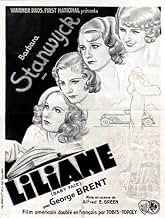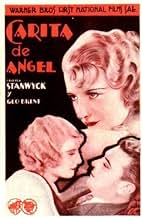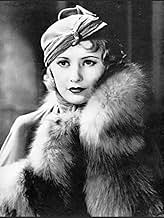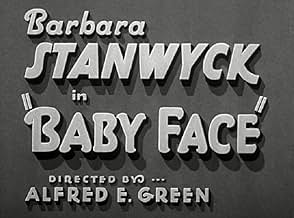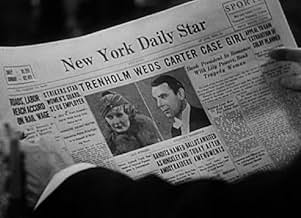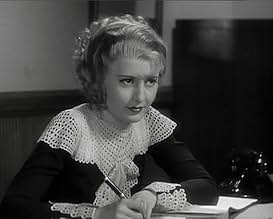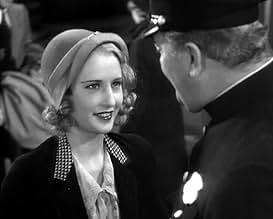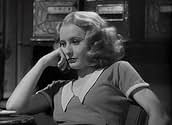Eine junge Frau, die ihr ganzes Leben lang sexuell ausgebeutet wurde, beschließt, den Spieß umzudrehen und die unglücklichen Männer einer großen Stadtbank auszubeuten - indem sie sich freudi... Alles lesenEine junge Frau, die ihr ganzes Leben lang sexuell ausgebeutet wurde, beschließt, den Spieß umzudrehen und die unglücklichen Männer einer großen Stadtbank auszubeuten - indem sie sich freudig nach oben schläft.Eine junge Frau, die ihr ganzes Leben lang sexuell ausgebeutet wurde, beschließt, den Spieß umzudrehen und die unglücklichen Männer einer großen Stadtbank auszubeuten - indem sie sich freudig nach oben schläft.
- Regie
- Drehbuch
- Hauptbesetzung
- Auszeichnungen
- 2 wins total
- Brody
- (as Douglas Dumbrille)
- Job Seeker
- (Nicht genannt)
- Paris Bank Clerk
- (Nicht genannt)
- Hodges
- (Nicht genannt)
- Speakeasy Waiter
- (Nicht genannt)
- Speakeasy Customer
- (Nicht genannt)
- Paris Bank Agent
- (Nicht genannt)
- Lutza
- (Nicht genannt)
Empfohlene Bewertungen
Although this movie should be regarded exclusively in itself, there is ONE comparison that inevitably comes to mind - to the OTHER great pre-Code movie that had been released just two months before "Baby Face", and constituted the other half of the gravestone that Will Hays would soon put on this kind of 'unacceptably immoral' movies: Mae West's "I'm No Angel"... In fact, the philosophy of the two starring ladies is just about the same; only that Mae expressed it in her own, casual way of 'Find 'em, fool 'em, and forget 'em', while Barbara goes by the philosophical advice of none other than Nietzsche: 'Face life as you find it - defiantly and unafraid. Waste no energy yearning for the moon. Crush out all sentiment.' And so she does - she uses her female assets to make a VERY quick career at a big bank, making it to the 'executive suite' in literally no time; she uses the way that Mae West had suggested in words and humorous double-entendres, but VERY explicitly and unequivocally for the whole audience. And she gives a MAGNIFICENT performance (maybe the best one of her whole, great career) as the tough gal determined to do EVERYTHING in order to reach the 'top' - and yet, just when she thinks she's got everything she wanted (everything measurable in dollars, jewels and fur coats, that is), her sentiment, that she'd been trying so hard to crush, sets in, and her 'success story' becomes a drama...
And that's exactly the difference between "Baby Face" and "I'm No Angel": Mae West, as always, takes even her most spicy adventures with humor, always staying on top of things and getting what she wants; while Barbara Stanwyck is forced by the circumstances almost from the beginning of her life to become a 'bad girl' - and that was obviously a TOO much realistic view of things for the Hays Office: while "I'm No Angel" finally got its seal, "Baby Face" was withdrawn from release and edited until it was 'fit' for distribution. But it was still HIGHLY explosive stuff, and soon afterwards the final curtain came down on those daring, 'outrageous' pre-Code movies in the shape of Will Hays' 'Bible' called the Production Code, which would from now on be rigorously applied to EVERY movie before it would be granted a seal.
So enjoy "Baby Face" as one of the most audacious pre-Code films - and as one of the VERY best movies of classic Hollywood in general, featuring one of the GREATEST performances of one of the GREATEST actresses of all times!
The focal point is on Lily Powers (Barbara Stanwyck), the sassy daughter of Nick (Robert Barrat), an abusive father of the slums of Pittsburgh who has her working as a barmaid in his speakeasy entertaining low-life factory working friends. After Nick is killed in an explosion, by which Lily watches, showing no remorse or emotion whatsoever, decides on leaving her hometown, accompanied by her friend, Chico (Theresa Haris) on a freight train for New York City. Upon her arrival, Lily uses whatever life has taught her to get ahead, rising up the corporate latter of a banking firm, by showing her feminine wiles to full advantage. Becoming responsible for the breakup between banker, Ned Stevens (Donald Cook) and his fiancée, Ann Carter (Margaret Lindsay), followed by a murder/suicide, the notorious scandal finds Lily about to transferred to the Paris branch until she captures the attention of Trenholm (George Brent), the new president of the Botham Trust Company, as her latest victim.
Featured in the supporting cast are Douglass Dumbrille (Brody, another one of Lily's "love slaves"); Nat Pendleton (Stolvich, a sleazy factory worker); Maynard Holmes (a personnel office clerk); with Alphonse Ethier, Henry Kolker and Charles Coleman in smaller roles. Along with Dumbrille, Cook and Kolker as men who fall prey to a gal called Lily, the biggest surprise is finding the youthful John Wayne, years prior to his major star status, as one of Lily's rejected suitors. Wayne's role as an office clerk is brief but noteworthy as being the one and only collaboration of the "Duke" and "Stanny." James Murray, the leading actor in MGM's silent masterpiece, THE CROWD (1928), in a career setback by this time, appeared briefly as a railroad brakeman. His scene, however, was taken out prior to its release. A director's complete cut that included Murray and other edited scenes were later discovered and presented on TCM for the first time December 4, 2006.
A dress rehearsal for some of her latter tough-as-nails dramas as DOUBLE INDEMNITY (1944) and THE STRANGE LOVES OF MARTHA IVERS (Paramount, 1946), for example, Stanwyck plays Lily Powers to the hilt, a strong-willed woman with a lot of hate, especially towards men. When pitting them to their own destruction, her eyes stay motionless, detailing reactions through silence rather than with words. Regardless of movie title and popular song by Benny Davis and Harry Akst (scored during the opening credits) that could have served as a Broadway musical about a cute chorus girl, Stanwyck, hardly a "baby face" by any means, is referred to as such once by Jimmy McCoy (John Wayne) and office secretaries (one played by Toby Wing), but never referred to that name again. Aside from other songs, "I Kiss Your Hand, Madame" is underscored several times during the latter portion of the story.
A forerunner to the "trash" movies of the 1960s and 70s, what makes BABY FACE so watchable is the explicit way it uses sex and immorality out of camera range, leaving questionable situations to the imagination of the viewer. A prime example is witnessing Lily's job promotion up the corporate latter with the camera panning from the outside office window from personnel, filing, mortgage and accounting departments to the underscoring of burlesque-type music.
Could anyone else but Barbara Stanwyck handle such an assignment as depicted in BABY FACE? Joan Blondell, another resident Warner Brothers stock player, perhaps, considering how Stanwyck's blonde hairstyle bears a strong resemblance to Blondell's, especially during the more glamorized moments in the film's second half. Blondell, might have handled her task well, but the major difference is that Blondell, as good as she is, or was, wouldn't have handled the forcefulness the way Stanwyck had. Stanwyck, a brunette, was at her best playing nasty blondes, especially here and a decade later in DOUBLE INDEMNITY (1944).
Aside from BABY FACE as one of the favorites shown on TCM, it did have some exposure during the early 1990s on Turner Network Television (TNT) and distribution to home video as part of Leonard Maltin's "Forbidden Hollywood" series, and finally on DVD. For a worthwhile introductory to "pre-code" movies, either the complete or theatrical edited release of BABY FACE, along with Stanwyck's earlier NIGHT NURSE (1931), should be tops in the assembly line. (**1/2)
This is starkly displayed in Baby Face which was a pre code film and it is more frank in its use of sex as a means of getting what you want.
Lily Powers (Barbara Stanwyck) has been pimped out by her father since she was 14 year of age. Her father runs an illegal drinking den in Pittsburgh. Most of the patrons want to get an eyeful and feel of Lily.
When her father is killed, an elderly friend tells Lily to take a leaf out of the writings of Friedrich Nietzsche and go for greater things even if she has to use men. Lily and her afro american friend Chico (Theresa Haris) hop on a freight train for New York.
When they arrive in the big metropolis, Lily uses her feminine charms to get a job in a bank and go up the corporate ladder by sleeping her way to the top. This leads to tragedy when one of her suitors commits a murder and then kills himself.
The film with its frankness feels like a breath of fresh air. It actually looks modern. Stanwyck is alluring, there is a small early role for John Wayne, one of Lily's amorous victims. The film is unusual with Lily being close to a black character. Watching the restored version was like viewing a lost classic.
Wusstest du schon
- WissenswertesIn 2004, when Michael Mashon, a curator of the motion picture division at the Library of Congress, received a request for a print of this film, he discovered two negatives of the film: the original camera negative and a "duplicate negative" that was longer. The duplicate negative was the pre-release (uncensored) version of the film that was submitted to the New York State censorship board in 1933 for approval. The uncensored version received its public premiere at the London Film Festival in November 2004, more than 70 years after it was made. The existence of these negatives allows pristine quality prints to be made as compared to other surviving films of that era.
- PatzerWhen Lily reads from Nietzsche's book, Thoughts Out Of Season, the page that's highlighted repeats the same paragraph above, and again below, the highlighted lines.
- Zitate
Nick Powers: You little tramp, you!
Lily Powers: Yeah, I'm a tramp, and who's to blame? My Father. A swell start you gave me. Ever since I was fourteen, what's it been? Nothing but men! Dirty rotten men! And you're lower than any of them. I'll hate you as long as I live!
- Alternative VersionenThe original release had to be cut by four minutes to pass inspection by the New York Board of Censors. The cuts were mostly very minor, but the most notable were the scene where Lily admits that she began working as a prostitute when she was fourteen and the scene in the boxcar with the yardman, the closeup of the hand turning out the light. These scenes were cut before the film's release in 1933 and were not seen publicly until 2004.
- VerbindungenFeatured in Göttinnen der Liebe (1965)
- SoundtracksBaby Face
(1926) (uncredited)
Music by Harry Akst
Played during the opening credits
Played as background music often
Reprised on a phonograph record
Top-Auswahl
- How long is Baby Face?Powered by Alexa
Details
Box Office
- Budget
- 187.000 $ (geschätzt)
- Laufzeit1 Stunde 11 Minuten
- Farbe
- Sound-Mix
- Seitenverhältnis
- 1.37 : 1
Zu dieser Seite beitragen



